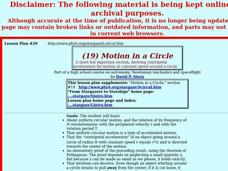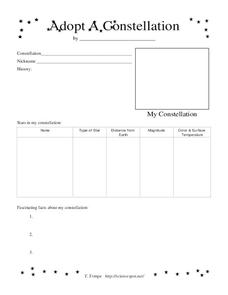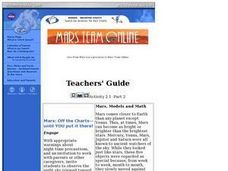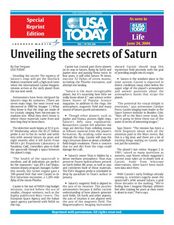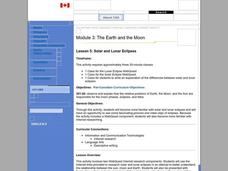Curated OER
MASS
Students distinguish between weight and mass. They examine how in oscillations of a mass against an elastic spring--in the absence of gravity, or in horizontal motion--the length of the oscillation period is proportional to the square...
Curated OER
NEWTON'S 3RD LAW
High schoolers examine the formal definition of Newton's 3rd law: "forces always originate in pairs, equal in magnitude and opposite in direction." --The informal, qualitative version: "Each action has an equal and opposite reaction."
Curated OER
MOTION IN A CIRCLE
High schoolers explore uniform circular motion, and the relation of its frequency of N revolutions/sec with the peripheral velocity v and with the rotation period T, and the "centripetal acceleration" of an object.
Curated OER
FRAMES OF REFERENCE: THE BASICS
High schoolers examine the concept of frames of reference in physics: that two frames of reference, each moving with respect to the other with a constant velocity v, observe the same accelerations and therefore Newton's laws are the same...
Curated OER
WAVES AND PHOTONS
Students examine the many types of electromagnetic waves, the concept of an EM wave, how James Clerk Maxwell proposed a slight modification of the equations of electricity, Heinrich Hertz and his radio-frequency, wavelengths, and light...
Curated OER
Stellar Navigation
Middle schoolers are introduced to the concept of stellar navigation. Inside a portable digital planetarium they identify various stars that were used as a navigational tool. They go through several activities in which they attempt to...
Curated OER
Adopt a Constellation
Students adopt a constellation and find detailed information about their constellation. In this constellation lesson plan, students use the web to find information about a constellation of their choice. They identify the history of the...
Curated OER
Finding Jupiter's Moons
Students explore Jupiter's Moons. They calculate and predict the location of Jupiter's 4 large moons. In addition, they draw Jupiter with its moons correctly shown for the time of the observation.
Curated OER
Measuring Elevation
Learners practice measuring elevation, one of the key coordinates used by astronomers. They describe how the elevation of an object is measured.
and combine compass directions and elevation to find celestial objects.
Curated OER
Three D Constellations
Students are introduced to both celestial coordinates and to the first rung on the distance determination ladder. They convert spherical coordinates to Cartesian coordinates to construct a three dimensional model of a constellation...
Curated OER
Student Illustrations and Writing About the Sun
Students discuss what they know about the Sun. The teacher distributes work sheets and asks students to draw the Sun and label any parts of it that they know. Students write what they know about the Sun.
Curated OER
Using Parallax to Determine Distances
Pupils study parallax and what it is used for. In this distance instructional activity students complete an activity that allows pupils to get experience using a parallax.
Curated OER
The Universe
Fifth graders identify and discuss responsibilities of careers related to the study of the universe, such as an astronomer or an astronaut. They compare what the world looks like now to what it might look like in the year 3000.
Curated OER
Mars: Off the Charts--Until You Put It There
Students explore the night sky and make illustrations which are shared in class the next day. Distinctions are made between the stars and the planets and views of the constellations for the season are made available. The work of early...
Curated OER
Unveiling the Secrets of Saturn
Students read and study an article then answer questions on Saturn. In this investigative lesson students identify ways space exploration has helped humanity and then they search the Internet for space pictures and sketch a drawing...
Curated OER
Moon Light Through the Month
Students work in small groups to arrange moon phase cards into the correct sequence. The goal is to circle as many consecutive numbers as possible in two minutes.
Curated OER
It's Just a Phase
Middle schoolers describe the phases of the moon and play a game with moon phase cards.
Curated OER
Astonishing Planetary Discovery
Students access the Internet, research one of the planets, copy and paste necessary information, and design a creature that would survive for a year on their planet. They present their creature and its qualities to the rest of the class.
Curated OER
Solar System Bowl
Students make up questions in groups about the solar system and quiz the other group. In this solar system lesson plan, students demonstrate good cooperative learning techniques by reviewing the solar system together and quizzing each...
Curated OER
Scholarship and Learning in Islam
Young scholars explain what a madrasah represents in Islam. Using the Muslim world as an example, they identify and describe two or more centers of learning. They explain the contributions that Muslims have made to science and math and...
Curated OER
Be A Planet
Students identify the name, order and attributes of the planets. They role play the position of planets, and draw pictures of the planets as well.
Curated OER
The Difference Between Comets, Meteors And Asteroids
Pupils use Venn diagrams to highlight the similarities and differences between comets, meteors, and asteroids.
Curated OER
Solar and Lunar Eclipses
Students complete a WebQuest in order to better explain solar and lunar eclipses. They observe images and videos of eclipses from around the world.
Curated OER
The Tides
Students experience a computer based applet that explains why the Earth experiences tides.
Other popular searches
- Astronomy and Space Science
- Space Science Astronomy
- Science Astronomy Stars
- Earth Science Astronomy
- Science Astronomy Graphing
- Life Science Astronomy
- "Astronomy and Space Science


